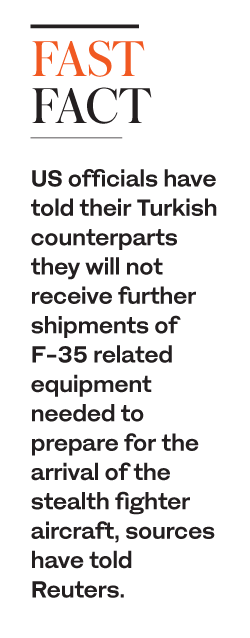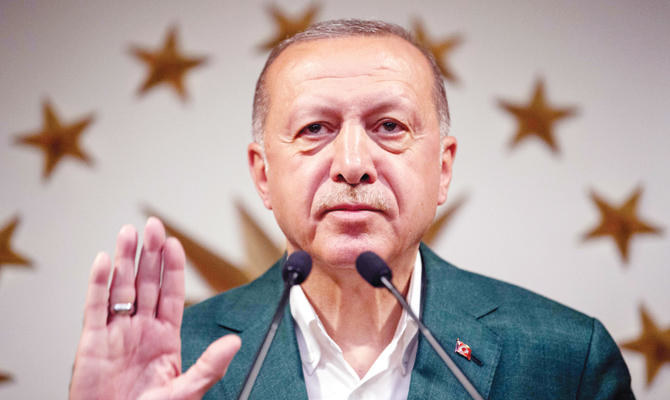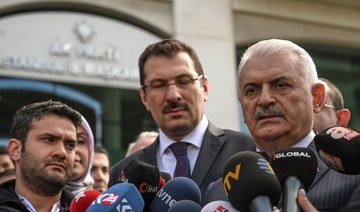ANKARA: There could be repercussions for Turkey’s foreign policy following losses for the president’s party in local elections, experts have told Arab News.
President Recep Tayyip Erdogan’s ruling Justice and Development Party (AKP) lost control over the capital Ankara and economic powerhouse Istanbul in Sunday’s vote.
International challenges include a clash with the US over plans to buy an air defense system from Russia and a reduced US presence in northern Syria.
The US has halted delivery of equipment related to the F-35 fighter aircraft to Turkey.
US officials have told their Turkish counterparts they will not receive further shipments of F-35 related equipment needed to prepare for the arrival of the stealth fighter aircraft, sources have told Reuters.
Washington’s step to block delivery of the jet comes amid fears in the US and other NATO allies, that radar on the Russian S-400 missile system will learn how to spot and track the F-35, making it less able to evade Russian weapons.
Dimitris Tsarouhas, a visiting scholar at Georgetown University, said Ankara and Erdogan had invested in the partnership with Russia while distancing themselves from the US.
“In that context, relations with countries like Russia will continue to prosper in the coming period,” he told Arab News.
But there would be consequences in terms of the continuing rapprochement with Bashar Assad’s regime in Syria. Tensions with the US would continue and Washington’s recent refusal to ship training equipment for the fighter jet project was an early indication of the fallout, he added.
Erdogan insists the Adana Protocol gives his country the right to intervene militarily in neighboring Syria. Turkey and its Syrian opposition proxies control part of northern Syria, and Ankara has repeatedly threatened another military operation against Kurdish fighters on its southern border.
But the Foreign Ministry in Damascus has accused Ankara of breaching the Adana deal throughout Syria’s war. In addition, Moscow and Ankara are at odds over who would control a proposed “safe zone” along Turkey’s border with Syria.
Tsarouhas said relations with the EU would continue to be characterized by their transactional nature. Mutual interests would lead to policy cooperation in select areas, he said, but without leading to real convergence between the two sides.
Government officials on the campaign trail often blamed foreign powers for currency fluctuations, with the lira dropping almost 30 percent against the dollar in last year’s currency crisis.
Karol Wasilewski, an analyst at the Warsaw-based Polish Institute of International Affairs, said Erdogan and his party would have to deal with the effects of his “electoral foreign policy” and that tension with the US was just one example of that.
“The situation may induce Erdogan to lead a more pragmatic foreign policy and to reduce the traditional West-bashing,” he told Arab News.
He was not convinced by suggestions that Erdogan would change his tune and become “a perfect” Western ally. “It would be rather the form and not the essence that would change. While Turkey may be less confrontational toward the West, simply because Erdogan wouldn’t need his anti-Western discourse to mobilize his electorate, Turkey would continue to be self-confident and assertive international player concentrated on national interests.”
Dr. Kerim Has, a Moscow-based Russia analyst, said Ankara in the short-term was going to find itself in a huge dilemma and that zigzagging remained the key feature of Turkey’s foreign policy.
“Erdogan urgently needs money and financial support from the West to overcome the deepening economic crisis in Turkey, whereas he is obliged to coordinate its policy and activities with Moscow in order not to get into trouble in Syria,” he told Arab News. “A similar quandary is likely to become more prominent and collisional between the S-400 missiles versus the F-35 fighter jets.”
Ankara may be pushed to reluctantly keep the ball rolling for a little while longer with Moscow, at least until it comes up with a creative solution to its economic problems, according to Has.
“Turkish authorities will also likely soon facilitate the ‘job’ of its Russian partners with the Syrian regime for a military offensive in Idlib. At the same time, Erdogan will probably try to find a tangible compromise with the US on northeastern Syria and the Kurdish issue specifically.”
Turkish Foreign Minister Mevlut Cavusoglu is set to meet with his US counterpart Mike Pompeo and National Security Adviser John Bolton on the sidelines of a NATO meeting in Washington on Thursday.
AKP’s local election losses could mean foreign policy trouble for Erdogan
AKP’s local election losses could mean foreign policy trouble for Erdogan

- Ankara, in the short term, is going to find itself in a huge dilemma, expert tells Arab News
Gaza baby rescued from dead mother’s womb dies

The baby suffered respiratory problems and a weak immune system, said Doctor Mohammad Salama who had been caring for Sabreen Al-Rouh
RAFAH, Gaza Strip: A baby girl who was delivered from her dying mother’s womb in a Gaza hospital following an Israeli airstrike has herself died after just a few days of life, the doctor who was caring for her said on Friday.
The baby had been named Sabreen Al-Rouh. The second name means “soul” in Arabic.
Her mother, Sabreen Al-Sakani (al-Sheikh), was seriously injured when the Israeli strike hit the family home in Rafah, the southernmost city in the besieged Gaza Strip, on Saturday night.
Her husband Shukri and their three-year-old daughter Malak were killed.
Sabreen Al-Rouh, who was 30-weeks pregnant, was rushed to the Emirati hospital in Rafah. She died of her wounds, but doctors were able to save the baby, delivering her by Caesarean section.
However, the baby suffered respiratory problems and a weak immune system, said Doctor Mohammad Salama, head of the emergency neo-natal unit at Emirati Hospital, who had been caring for Sabreen Al-Rouh.
She died on Thursday and her tiny body was buried in a sandy graveyard in Rafah.
“I and other doctors tried to save her, but she died. For me personally, it was a very difficult and painful day,” he told Reuters by phone.
“She was born while her respiratory system wasn’t mature, and her immune system was very weak and that is what led to her death. She joined her family as a martyr,” Salama said.
More than 34,000 Palestinians, many of them women and children, have been killed in the six-month-old war in Gaza between Israel and Hamas militants, according to the Gaza health ministry. Israel denies deliberately targeting civilians in its campaign to eradicate Hamas.
Much of Gaza has been laid to waste by Israeli bombardments and most of the enclave’s hospitals have been badly damaged, while those still operating are short of electricity, medicine sterilization equipment and other supplies.
“(Sabreen Al-Rouh’s) grandmother urged me and the doctors to take care of her because she would be someone that would keep the memory of her mother, father and sister alive, but it was God’s will that she died,” Salama said.
Her uncle, Rami Al-Sheikh Jouda, sat by her grave on Friday lamenting the loss of the infant and the others in the family.
He said he had visited the hospital every day to check on Sabreen Al-Rouh’s health. Doctors told him she had a respiratory problem but he did not think it was bad until he got a call from the hospital telling him the baby had died.
“Rouh is gone, my brother, his wife and daughter are gone, his brother-in-law and the house that used to bring us together are gone,” he told Reuters.
“We are left with no memories of my brother, his daughter, or his wife. Everything was gone, even their pictures, their mobile phones, we couldn’t find them,” the uncle said.
UN denounces ‘more serious’ Iran crackdown on women without veils

- Hundreds of businesses including restaurants and cafes have been shut down for not enforcing the hijab rule
- More women began refusing the veil in the wake of the 2022 death in custody of 22-year-old Mahsa Amini
GENEVA: The United Nations said Friday that it was concerned by reports of new efforts to track and punish Iranian women, some as young as 15, who refuse to wear the headscarf required under the country’s Islamic law.
The UN Human Rights Office also expressed alarm about a draft bill on “Supporting the Family by Promoting the Culture of Chastity and Hijab,” which would impose tougher sentences on women appearing in public without the hijab.
“What we have seen, what we’re hearing is, in the past months, that the authorities, whether they be plainclothes police or policemen in uniform, are increasingly enforcing the hijab bill,” Jeremy Laurence, a spokesman for the office, said at a press conference.
“There have been reports of widespread arrests and harassment of women and girls — many between the ages of 15 and 17,” he said.
Iranian police announced in mid-April reinforced checks on hijab use, saying the law was increasingly being flouted.
Hundreds of businesses including restaurants and cafes have been shut down for not enforcing the hijab rule, and surveillance cameras are being used to identify women without it, Laurence said.
More women began refusing the veil in the wake of the 2022 death in custody of 22-year-old Mahsa Amini after her arrest by Iran’s morality police for allegedly breaking the headscarf law, which sparked a wave of deadly protests against the government.
Laurence said that on April 21, “the Tehran head of the Islamic Revolutionary Guard Corps announced the creation of a new body to enforce existing mandatory hijab laws, adding that guard members have been trained to do so ‘in a more serious manner’ in public spaces.”
And while the latest draft of the new hijab bill has not been released, “an earlier version stipulates that those found guilty of violating the mandatory dress code could face up to 10 years’ imprisonment, flogging, and fines,” he said, adding that “this bill must be shelved.”
The Human Rights Office also called for the release of a rapper sentenced to death for supporting nationwide protests sparked by Amini’s death.
Toomaj Salehi, 33, was arrested in October 2022 for publicly backing the uprising.
“All individuals imprisoned for exercising their freedom of opinion and expression, including artistic expression, must be released,” Laurence said.
UN seeks to deescalate Sudan tensions amid reports of possible attack

- UN Secretary-General Antonio Guterres’ envoy is engaging with all parties to deescalate tensions
UNITED NATIONS: The United Nations is increasingly concerned about escalating tensions in Al-Fashir in Sudan’s North Dafur region amid reports that the Rapid Support Forces are encircling the city, signaling a possible imminent attack, the UN’s spokesperson said on Friday.
UN Secretary-General Antonio Guterres’ envoy is engaging with all parties to deescalate tensions in the area, the spokesperson said.
Israeli army says missile fire kills civilian near Lebanon

- The violence has fueled fears of all-out conflict between Iran-backed Hezbollah and Israel
- “Overnight, terrorists fired anti-tank missiles toward the area of Har Dov in northern Israel,” the Israeli army said
JERUSALEM: The Israeli army said Friday a civilian was killed near the country’s northern border with Lebanon, as near-daily exchanges of fire with Hezbollah rage.
Both sides have stepped up attacks this week, with Hezbollah increasing rocket fire and Israel saying it had carried out “offensive action” across southern Lebanon.
The violence has fueled fears of all-out conflict between Iran-backed Hezbollah and Israel, which last went to war in 2006.
“Overnight, terrorists fired anti-tank missiles toward the area of Har Dov in northern Israel,” the Israeli army said, referring to the disputed Shebaa Farms district.
“As a result, an Israeli civilian doing infrastructure work was injured and he was later pronounced dead.”
Israeli media reported that the victim was an Arab-Israeli truck driver. Police told AFP they had not identified the body, but said it was the only one found after a truck was hit.
Hezbollah said it had destroyed two Israeli vehicles in the Kfarshuba hills overnight in a “complex ambush” on a convoy using missiles and artillery.
The Israeli army did not comment directly on the claim.
It said Israeli fighter jets struck Hezbollah targets around Shebaa village in southern Lebanon including a weapons store and a launcher, while soldiers “fired to remove a threat in the area.”
It said fighter jets also “struck Hezbollah operational infrastructure in the area of Kfarshuba and a military compound in the area of Ain El Tineh in southern Lebanon.”
Lebanon’s official National News Agency reported that Shebaa village, Kfarshuba and Helta were targeted by “more than 150 Israeli shells,” leaving homes damaged.
Iran-backed Hezbollah has been trading almost-daily fire with the Israeli army since the day after its Palestinian ally Hamas carried out an unprecedented attack on Israel on October 7.
Since October 8 at least 380 people have been killed in Lebanon, including 252 Hezbollah fighters and dozens of civilians, according to an AFP tally.
Israel says 11 soldiers and nine civilians have been killed on its side of the border.
Tens of thousands of people have been displaced on both sides.
EU commits $73 million more for Gaza aid

- New EU aid would be focused on food deliveries, clean water, sanitation and shelters
- The EU and United States have demanded that Israel allows more aid into Gaza
BRUSSELS: The European Union on Friday said it was giving an extra 68 million euros ($73 million) to provide desperately needed aid to Palestinians in Gaza.
The territory has been devastated by more than six months of Israeli bombardment and ground operations after Hamas’s October 7 attack, leaving the civilian population of two million people in need of humanitarian assistance to survive.
“In light of the continued deterioration of the severe humanitarian crisis in Gaza, and the steady rise of needs on the ground, the (European) Commission is stepping up its funding to support Palestinians affected by the ongoing war,” an EU statement said.
“This support brings total EU humanitarian assistance to 193 million euros for Palestinians in need inside Gaza and across the region in 2024.”
The EU said the new aid would be focused on food deliveries, clean water, sanitation and shelters, and would be channelled through local partners on the ground.
The United Nations has said Israel’s operation has turned Gaza into a “humanitarian hellscape,” amid fears of a looming famine.
The EU and United States have demanded that Israel allows more aid into Gaza.
The US military said on Thursday it had begun construction of a pier meant to boost deliveries to the territory.
The war in Gaza began with an unprecedented Hamas attack on Israel on October 7 that resulted in the deaths of about 1,170 people in Israel, according to an AFP tally of Israeli official figures.
Israel vowed to destroy Hamas, with a retaliatory offensive that has killed at least 34,356 people in Gaza, mostly women and children, according to the Hamas-run territory’s health ministry.




















